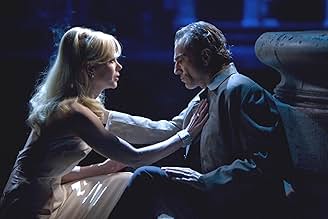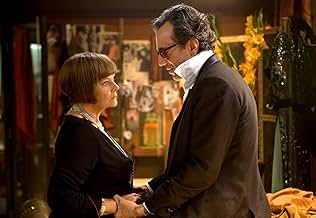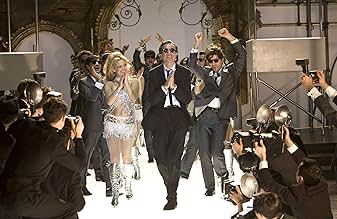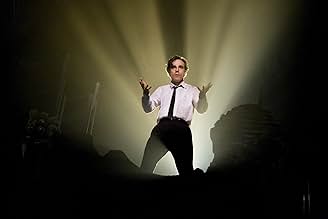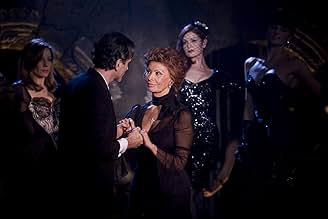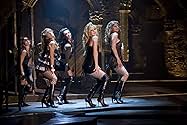Pasión, fantasía, lujuria, amor, arte, estilo, desilusiones, sueños la vida siempre ha sido un circo para el mundialmente famoso director de películas de la década de 1960, Guido Contini.Pasión, fantasía, lujuria, amor, arte, estilo, desilusiones, sueños la vida siempre ha sido un circo para el mundialmente famoso director de películas de la década de 1960, Guido Contini.Pasión, fantasía, lujuria, amor, arte, estilo, desilusiones, sueños la vida siempre ha sido un circo para el mundialmente famoso director de películas de la década de 1960, Guido Contini.
- Dirección
- Guionistas
- Elenco
- Nominado a 4 premios Óscar
- 8 premios ganados y 60 nominaciones en total
Opiniones destacadas
Performances: Let me first say that no actress delivered any less than they possibly could, and you could tell that the cast had worked their butts off during production.
The Great- Marion Cotillard in particular delivered what is sure to be one of the most understated performances in recent memory, as well as delivering the two most powerful and emotional numbers in the show. Penelope Cruz was SEXY, and as her character's story was wrapped up she beautifully portrayed a "mistreated mistress," so to speak. Judi Dench was fantastic as the background player in Guido's career, perfectly delivering wit while supporting her friend. Most importantly, these three worked so well because they were interlinked in each other's story, and as a result their plot lines flowed well into each other.
The OK- DDL and Sophia Loren were fine in their parts, simply filling out their roles and not seriously improving on or dragging down the movie in any way.
The Misused- Nicole Kidman, Kate Hudson, and Fergie were all criminally misused, although fantastic when on the screen. All three had stories that didn't synch with the movie, whether they be Kidman (who honestly needed a more fleshed out role that came in contact w/ other characters other than just Guido), Hudson (whose number really felt like it would have made more sense in the beginning of the movie), or Fergie ("Be Italian" felt shoehorned in and disconnected, and would have been a perfect opener or closing number). All three felt particularly disconnected from the film.
I can honestly say that not one of the players in Marshall's cast disappointed, but it was Marshall himself and the messy script (irony!) that jumbled up the movie and left me with a very disjointed, disconnected result. Each scene was Oscar-worthy, but they were only partially threaded together into a cohesive story.
However the problem is, these fantastic song and dance number are united by a very thin storyline, that of a premiere Italian director Guido Contini (played by Daniel Day Lewis) who seemed to be stuck in a perpetual artist's block. In fact, he does not even have a script yet for his much-awaited new feature film with the grandiose title of "Italia"! The musical numbers express his relationship with the various women in his life. However, this main character (or even his songs) is not really very appealing nor sympathetic nor interesting. You really need some patience to get through "Nine." It is just like watching a series of music videos held together by a very tenuous connecting string, ready to unravel at any time. Director Rob Marshall does his best with the thin "plot" but this is certainly not "Chicago." I think "Nine" would be better appreciated on DVD. You would wish you could just fast-forward to the next song number and skip all the dour Contini parts.
The original movie was a phantasmagoric blending of memory, reality and wish-fulfillment fantasy, focused on a major Italian film director caught in creative crisis (a figure obviously based on Fellini himself). Daniel Day-Lewis takes on the role, made famous by Marcello Mastroianni, of the filmmaker (now named Guido Contini) who "has nothing left to say" - either as a man or as an artist - a man so harried and hounded by producers, subordinates, reporters, detractors, sycophants, and assorted hangers-on that he sneaks away for a rest-cure at an out-of-the-way health spa. With all his creative juices dried up and feeling that he will have a nervous breakdown if he has to make even one more statement or executive decision regarding his film, Guido, like many of us, believes he will find the peace he so desperately yearns for by retreating from the outside world. But Guido soon discovers that there is no escaping from the people and pressures of the world in which we live - nor from our religious and familial upbringing - for they are each of them an integral part of the fabric that makes us who we are.
Visually, "Nine" captures all the flash, dash and excitement of life among the glitterati in the Eternal City circa 1965. In terms of plot and incident, the Michael Tolkin/Anthony Minghella screenplay (itself derived from Arthur Kopit's Broadway adaptation) follows the original fairly closely, but what's missing is the spark of cinematic genius that Fellini alone could bring to the material. But can one reasonably have expected that, anyway? As a director, Rob Marshall does an impressive job re-staging the dramatic portions, but he certainly doesn't have Fellini's flair for the carnival-like atmosphere that became a signature feature of all his later works (but, then again, who does?). However, as he did in "Chicago," Marshall demonstrates that he knows how to slide in and out of the musical numbers without being unduly jarring about it. That's particularly challenging given that most of the numbers - which serve as reflections of the characters' thoughts and feelings and the movie's themes - are done largely on surrealistic soundstages, as opposed to the on-location filming of the non-musical portions of the movie.
No surprise, Day-Lewis is superb as the dashing but world-weary director (truly as much a celebrity as an artist), perfectly capturing the angst, frustration and conflict taking place deep within the soul of a creator who still has so much to say - despite his protestations to the contrary - but not the slightest clue of how to say it. Guido is clearly trying to be a good person, but all those inner demons are doing their best to thwart him at virtually every turn. There are many moving moments of deep introspection, as Guido contemplates the direction of his life and the effect his actions are having on the people he loves. I'm going to go out on a limb here, and it may sound like blasphemy even to say this, but Day-Lewis lets us see his character's pain in a way that even Mastroianni himself did not. Interestingly, by tamping down some of Fellini's cinematic "distancing devices" and icy-cool tone, the movie actually allows us to relate with Guido on a more personal level and to care more deeply about his plight.
Marion Cotillard replaces Anouk Aimee as Guido's devoted but long-suffering wife who knows about her husband's infidelity and who suspects he has become a filmmaker as a means both of avoiding having to deal with real life and of achieving personal forgiveness and redemption for himself; Penelope Cruz stars as Guido's flighty mistress, whose sudden appearance at the spa throws Guido's world into a tizzy; and Sophia Loren puts in an occasional appearance as Guido's recently deceased mother who gives him words of advice and comfort from beyond the grave. Nicole Kidman portrays Claudia, the beautiful young starlet who loves Guido but ultimately refuses to be just another of his numerous "conquests." Judi Dench plays the fashion designer who appears to be the one level-headed and brutally honest person whom Guido can turn to for advice and support. And all of them are excellent.
One thing that "Nine" has going for it that "8 ½" didn't is the perspective that comes with the passage of time. When the original was released, it WAS "Italian Cinema" - and everything that went along with that term. As a result, the movie was totally unconscious of itself and the place it and other films of its time period would occupy in movie history. "Nine," with the ability to look back on the era from a much later perspective, is able to convey all this in a way that those earlier films, including "8 ½" itself, could not. In this sense, "Nine" sees "8 ½" more as an artifact than as the contemporary trailblazer it was in its time.
As with all remakes and "re-imaginings" of classic works, we must finally ask ourselves the crucial question: "Is this trip really necessary?" I think in the case of "Nine," I will have to go with "Yes" - or, if not "necessary," at least audacious and stimulating. "8 ½" aficionados and Fellini purists may have trouble warming up to this version, but I see it not as a denigration of the master and his great work, but as a tribute to them.
Marshall, Oscar nominated for his breakthrough directorial debut Chicago, lost all the flavor and originality we once respected him for. The performances of most are right on target; get the job done, and sure to break through some awards buzz this season. The narrative by Michael Tolkin and the late Anthony Minghella is flat, unemotional, and vacant. The songs are tedious and a bit monotonous in their delivery, despite the cast surprisingly having good vocal chops. You would think that a big time musical such as Nine would have big notes that engage the viewer, and an interpretation that would move the viewer. None of those occur often enough in the film. Nine is not a failure, it just suffers major malfunctions that don't keep the machine moving.
Daniel Day-Lewis helms the picture as Guido Contini, an Italian director looking for inspiration for his next film. Day-Lewis gives a solid effort which we haven't seen from him before but in comparison to his previous works in There Will Be Blood and Gangs of New York, he doesn't elevate the material as often or doesn't translate his musical numbers like he should. When he's not singing, Day-Lewis is in charge, in top form, and showing what he's always excelled at, decode a character's feelings and become an inferno of talent.
Marion Cotillard is easily the most sentimental and profound player in the entire picture playing the heartrending Luisa, Guido's adulterated wife. What Cotillard has demonstrated beyond any type of acting capacity, a sexy, stylish, and devastating performance. With her two musical numbers, "Take It All" and "My Husband Makes Movies," Cotillard improves and exalts one of the most poignant performances of the year. This is the single performance of the film that Oscar shouldn't miss out on.
Nicole Kidman, Oscar winning actress for The Hours, is as wasted as she is unimportant playing the beautiful Claudia, Guido's muse for his film. Kidman's one big scene of the film becomes a borefest of words that have no verbal value to the viewer or the story. Unfortunately Kidman is the forgettable cast mate that is ultimately invisible. She's unused, underwritten, and employed as movie wallpaper. For shame.
Judi Dench as the costume designer Lilli has one big musical number which again is uninspired and lackluster. She has charisma in her speaking scenes and sort of upstages Day-Lewis much of the time, she eventually falls victim to a bland, insipid account.
Sophia Loren, the beautiful veteran Italian actress plays Mamma as in Guido's Mom, and gives a presence of royalty that the film lacks. She walks through the film with a manifestation of poise and allure.
Kate Hudson, as the cute Stephanie, the fashion critic for Vogue Magazine, is surprisingly fresh and fun. Her "Cinema Italiano" is one of the more pleasurable and enjoyable numbers in the film. It's nice to see Hudson give a bright, inventive cinematic turn in lines with her Oscar nominated work in Almost Famous.
Fergie is one of the sexier parts of the film as Saraghina, the lust of Guido's adolescence. Her "Be Italian" in terms of vocal capability is the best of the movie experience. Big notes, modern-like, and innovativeness, Fergie is one of the memorable players here but in terms of actual "acting," she's never given the chance to show what she can do.
Penelope Cruz, in one of her most aggressive and provocative turns yet plays the luscious Carla, Guido's married mistress. Cruz, in the film's opening number, is eager and provides hope to what seemed was going to be a promising experience. Along with Cotillard, Cruz is an Oscar worthy player. Fascinating, passionate, and enthusiastic along encompasses the traits in Ms. Cruz's arsenal.
Technically, the film sits very well. A stunning art director controlling the date and time of Marshall's film is quite good. Dion Beebe regulates our essential point of view and how dazzling it can look despite any flaws narratively. At it again, Colleen Atwood shows how she's one of the top designers in the business. Marshall in the end copycats himself, which is not a directorial style rather a Chicago-repeat without the razzle-dazzle.
Consequently, Rob Marshall's Nine isn't terrible, which doesn't say much. It's passable, average, and done before. It may not have been the screen writers liability for the strikeout, it's just an un-fascinating and awkwardly weak show. Nine, the film, however, is awkwardly coy, which is not an imaginative sense that the viewer anticipated. Nine in the end, in the finale, walking out of the theater, everything you thought about it, levels out just fine, which I guess is admirable. Is it Oscar bound? Unfortunately yes.
**½/****
I am at a disadvantage because I didn't see the musical, but quite a bit was cut from the score, which is a shame. The music is wonderful and probably was meant to be sung a little better than it was in the film.
"Nine" is the story of a great filmmaker, Guido Contini, who is about to make another film but doesn't actually have another one. His life is a mess - a wife, a mistress, no script, and no inspiration. He has to come to grips with his immaturity, his women, and with the reality of his life before he can move on.
Each of Guido's women has a song that expresses her feelings, the most famous of which is "Phone Call from the Vatican," sung by Carla (Cruz). This number was performed by the late Anita Morris on stage and considered very risqué. For me, the best filmed number in the whole film was "Cinema Italiano," done by Kate Hudson, and Judi Dench does a great job with the "Folies Bergere" number. "Unusual Way" is perhaps the prettiest song in the score, and that was done by Nicole Kidman.
We don't get much of a chance to know the women in Guido's life with the exception of Luisa (Cotillard) who gives a lovely, gentle performance as a woman who loves her husband but is continually hurt by him, and Carla, who despite her overt sexiness, is actually very fragile. And we get to know Lilli, the costumer, who knows Guido very well indeed and is the voice of reason.
The movie is pretty to look at, and the women are absolutely stunning, particularly Cotillard, Kidman, and Cruz, who looked like goddesses. Daniel Day-Lewis lived in Italy for a while and his accent is excellent. He's handsome and sexy, possibly more introverted than one of the stage Guidos - Raul Julia, Antonio Banderes, Sergio Franchi, or John Stamos.
Since this film moves slowly in parts, it's curious that so many songs were left out.
In the final analysis, though I liked parts of "Nine," I think it's too theatrical a show to lend itself to film. As a theater piece, it's fabulous - the original show was a hit, as was the revival.
I know some people hated this movie, but it's not awful. It's just not great.
¿Sabías que…?
- TriviaWhen it was decided to make a play out of Federico Fellini's 8½ (1963), the rights were easy to obtain from Fellini; his only condition was that neither his name nor the title 8 1/2 should be connected to it.
- ErroresWhen Guido drives up to the Cinecitta film studios in his open top Lancia with his producer as passenger, parked outside (to left) is a (quite distinctive) two tone white and blue paint job rear-engined (flat front radiator) car (another Lancia?): as soon as they pull up inside the lot, as they exit the car and walk around the lot, camera pulls back to show an exact same (license plate same /similar) car parked on other side.
- Citas
Luisa Contini: Thank you.
Guido Contini: What for?
Luisa Contini: Thank you for reminding me I'm not special. You don't even see what you do, do you? Even the moments I think are ours, it's just you working to get what you want.
- ConexionesFeatured in The Jay Leno Show: Episode #1.44 (2009)
Selecciones populares
Detalles
- Fecha de lanzamiento
- Países de origen
- Sitios oficiales
- Idiomas
- También se conoce como
- Untitled Rob Marshall Project
- Locaciones de filmación
- Positano, Salerno, Campania, Italia(on location)
- Productoras
- Ver más créditos de la compañía en IMDbPro
Taquilla
- Presupuesto
- USD 80,000,000 (estimado)
- Total en EE. UU. y Canadá
- USD 19,676,965
- Fin de semana de estreno en EE. UU. y Canadá
- USD 257,232
- 20 dic 2009
- Total a nivel mundial
- USD 54,004,950
- Tiempo de ejecución
- 1h 58min(118 min)
- Color
- Mezcla de sonido
- Relación de aspecto
- 2.39 : 1







